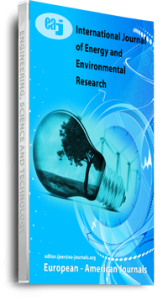Bio-energy which is the energy resources derived from organic matter has contributed significantly to primary energy supply in most developed countries of the world. The extensive use of biomass for electricity generation started recently as a more efficient option of providing energy. To encourage investment in this area, detail analysis on the prospect of Biomass energy generation system in Nigeria context need to be carried out. In line with this, this study assesses the viability of setting up a Biomass Energy Plant in Nigeria using rice husk. It determine the availability of rice husk for the project and identify the economic advantage of using rice husk as a feedstock in generating electricity while evaluating the energy conversion technology adopted with consideration on its environmental impact. The proposed plant location is Abakiliki Rice Mill complex and Gasification technology was adopted for the bio conversion process. Data on the feedstock availability was collected by direct measurement of the resources at the various mill dump site in the Rice Mill Complex and analyzed using Python analytical and visualization tools (Numpy and Seaborn). The primary source of data for the analysis is data gotten from the field and Nigeria Energy Regulatory Council (NERC) while the secondary source of data is data from related work over the internet. The outcome of the study showed that the Rice Complex have the capacity to produce the quantity of rice husk required to generate 499,320KWh of electricity per year using Bio-Energy plant. Also, the mass of rice husk produced is significantly higher in the month of October, November and December due to the weather condition (dry season) and the high demand of rice as the result of the festivity (Christmas celebration). When the performance of the existing system and the proposed Bio-Energy plant was compared in terms of per Kilowatt cost of energy generation, it was observed that the new system outperformed the existing one. This is traceable to the good caloric value of rice husk and its availability in very large quantity at no cost. To determine the system’s sustainability, the financial feasibility of operating a Biomass plant in Nigeria was also carried out; levelised cost, simple payback period and return on investment (ROI) as important financial metrics were calculated using real data.
Citation: Ogungbenro, Oluwaseyi Akinyele; Okoro, Israel Chidi; Ohuabunwa, Augustine Ebere; Okwuelu , Nnaemeka; Tagbo, Peter (2022) Performance Analysis of Bio-Energy Based Power Generation System in Nigeria Using Rice Husk Feedstock, International Journal of Energy and Environmental Research, Vol.10, No.2, pp.,40-56
Keywords: Biomass, Rice Husk, bio-energy plant, energy generation, feedstock availability

